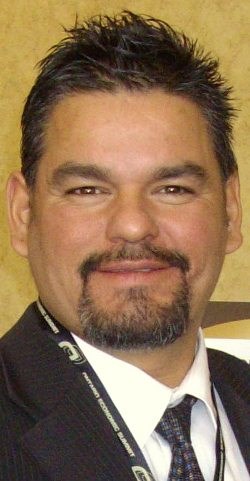NEWS RELEASE
ANISHINABEK NATION
************************* We are treaty citizens with inherent rights - not Indian Act children
SERPENT RIVER FN - Lake Huron Regional Grand Chief Isadore Day, Wiindawtegowinini [shown] says that an upcoming Special Chiefs Meeting to be held in Garden River First Nation is going to be a significant political gathering.
Chiefs from across the Anishinabek Nation will be talking governance, and each respective leadership and their advisors will review updates on all major self-government agreements central to the mandate of the Union of Ontario Indians.
The Lake Huron chief says: "We are in interesting times with this process. Much work has been covered on education and self-government agreements that see our First Nations in a greater position to take steps to restoring jurisdiction, currently held by Canada under the Indian Act."
He explains that while this is a good step forward, "We are no further ahead of real change if we don't recognize the issues around restoring jurisdiction within our treaty and traditional lands. Sectoral agreements do not measure up to sovereignty."
Day applauds the work of the grand chief of the Anishinabek Nation, Patrick Madahbee, and states that the political discipline that the grand chief often speaks about is most needed during these times.
He further reinforces that "occupying the field," a Madahbee mantra, is vital on both the legislative front as well as exercising rights at the grassroots level.
"Moving forward, we can't forget that it is the Crown that must reconcile its role in implementing treaties and respecting inherent rights. This is not a matter of waiting until sectoral education and self-government agreements are ratified," urges Lake Huron Grand Chief Day.
"We must be firm in initiating parallel a discussion that creates a strong foundation for true reconciliation - jurisdiction on land issues. We are treaty citizens with inherent rights, not Indian Act children."
To move this discussion ahead, Day will be presenting a treaty implementation strategy that he thinks is necessary to formally declare harvesting jurisdiction within Anishinabek treaty regions.
He says that harvesting was not only a way of survival in yesteryear but hunting, fishing, and gathering represents a critical key in reconciling the "Spirit and Intent" of treaties - today.
Another connected key element of the treaty discussion that he sees as very relevant is citizenship and addressing encroachment of the Indian Act on those rights.
"If we ask the question," Day points out, "did the treaty give me hunting rights? The answer is no, those rights are inherent. If that's the case then why is it that an Indian Act status card has a say over my hunting rights in my treaty territory? Further, who gave Canada and Ontario the authority to impose the 'status card requirement' for verifying my treaty citizenship and the rights attached?"
To that end, Lake Huron Regional Chief Day says that he intends to raise this discussion as a means to shed some light on a test case assertion that he has been discussing with many on the treaty citizenship right to harvest without derogation of those rights from the Crown.
"If we want to talk self-government, let's start moving yardsticks that will complement and give a deeper foundation of sovereign assertion of our rights and jurisdiction on the land," says Day.
The latest discussions with Ontario on this matter indicate that they are extremely reluctant to pursue pressing any charges against a "treaty citizen with lineage to the treaty without an Indian Status Card" during a harvest on provincial crown lands.
The Lake Huron Regional grand chief suggests that a great amount of work is now needed to build a jurisdictional framework for consideration that is treaty region-based and is established based on the direction of our communities.
"Our next step from here is to occupy the field, assert our right to harvest without having to brandish an Indian status card. We are not Indians; we are Anishinabek with rights that pre-date treaties, this country, the provinces and the Indian Act. It's that simple," concludes Day.
The Anishinabek Nation established the Union of Ontario Indians as its secretariat in 1949.
The UOI is a political advocate for 39 member communities across Ontario, representing approximately 55,000 people.
The Union of Ontario Indians is the oldest political organization in Ontario and can trace its roots back to the Confederacy of Three Fires, which existed long before European contact.
*************************
